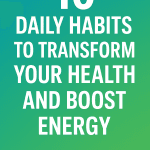This article is for informational purposes only and is not a substitute for professional medical advice. Always consult a healthcare provider for personalized guidance.
Understanding the Connection Between Nutrition and Mental Health
Nutrition plays a crucial role in our mental well-being. Did you know that certain foods can influence your mood and emotional health? Research suggests that what we eat can significantly affect our brain function, including our mood, stress levels, and even our risk for mental health disorders. The gut-brain connection is a fascinating area of study, highlighting how our digestive system impacts our mental state. For instance, a diet rich in fruits, vegetables, whole grains, and healthy fats has been linked to improved mental health outcomes. Conversely, diets high in processed foods, sugars, and unhealthy fats may contribute to anxiety and depression. So, how can we harness the power of nutrition to boost our mental health?
Key Nutrients for Mental Wellness
To start, let’s explore some essential nutrients that can help support mental health:
1. Omega-3 Fatty Acids
Omega-3 fatty acids, found in fish like salmon, walnuts, and flaxseeds, are known for their brain-boosting properties. These essential fats are crucial for maintaining the structure of brain cells and facilitating communication between them. Studies have shown that omega-3s can reduce symptoms of depression and anxiety (Source: PubMed). They work by modulating neurotransmitter pathways, including serotonin, which plays a key role in mood regulation. Aim for at least two servings of fatty fish per week or consider a high-quality fish oil supplement. Additionally, omega-3s may help reduce inflammation, which is increasingly recognized as a contributing factor to mood disorders.
2. Antioxidants
Fruits and vegetables are rich in antioxidants, which help combat oxidative stress in the body. Oxidative stress can lead to inflammation and is linked to various mental health disorders. Berries, leafy greens, and nuts are excellent sources. A diet high in antioxidants has been associated with lower rates of depression (Source: NCBI). Incorporating a variety of colorful produce into your meals not only enhances your nutrient intake but also provides a visual feast that can uplift your spirits. Consider foods like blueberries, spinach, and dark chocolate, which are particularly high in antioxidant properties.
3. B Vitamins
B vitamins, particularly B6, B12, and folate, are vital for brain health. They are involved in the synthesis of neurotransmitters that regulate mood and may reduce the risk of depression. Foods such as eggs, legumes, and leafy greens are great sources. A deficiency in these vitamins can lead to cognitive decline and mood disturbances, so consider incorporating these into your meals regularly. For example, a breakfast of scrambled eggs with spinach and whole grain toast can provide a healthy dose of B vitamins to start your day.
4. Probiotics
The gut-brain connection is a fascinating area of research. Probiotics found in yogurt, kefir, and fermented foods can positively influence your gut microbiome, which in turn can affect your mood and mental health (Source: NCBI). A healthy gut microbiome is associated with lower levels of anxiety and depression. Aim for a variety of fermented foods in your diet to promote a diverse microbiome. For instance, adding kimchi or sauerkraut to your meals can enhance gut health and, consequently, your mood.
5. Hydration
Staying hydrated is essential for optimal brain function. Even mild dehydration can affect your mood and cognitive abilities. Water is crucial for maintaining the balance of electrolytes, which are necessary for nerve function. Aim for at least 8 cups of water a day, and consider herbal teas or water-rich fruits and vegetables as part of your intake. Interestingly, studies have shown that proper hydration can enhance cognitive performance and reduce feelings of fatigue, which can contribute to improved mental clarity.
Practical Nutrition Tips for Mental Health
Now that we’ve covered the key nutrients, let’s discuss practical tips to incorporate these into your daily routine.
1. Plan Balanced Meals
Strive for meals that include a balance of protein, healthy fats, and carbohydrates. For example, a meal of grilled salmon, quinoa, and a side of steamed broccoli provides omega-3s, B vitamins, and antioxidants. Consider meal prepping to save time during the week and ensure you have healthy options readily available. A well-planned grocery list can also help you stick to your nutritional goals.
2. Snack Wisely
Choose snacks that nourish your brain. Instead of reaching for chips or candy, opt for a handful of nuts, a piece of fruit, or yogurt with berries. These options provide lasting energy and essential nutrients. Keep healthy snacks accessible to avoid the temptation of less nutritious choices. For instance, preparing snack bags of mixed nuts or cut-up vegetables can make healthy snacking easier.
3. Experiment with New Recipes
Cooking can be therapeutic! Try new recipes that incorporate a variety of colorful fruits and vegetables. Consider a stir-fry with bell peppers, broccoli, and tofu, or a smoothie with spinach, banana, and almond milk. Engaging in the cooking process can also enhance your relationship with food and make mealtime more enjoyable. Don’t hesitate to explore different cuisines that emphasize fresh ingredients, such as Mediterranean or Asian dishes.
4. Mindful Eating
Practice mindful eating by slowing down and savoring your meals. This can help you tune into your body’s hunger signals and increase your enjoyment of food. Try to eliminate distractions, such as screens, during meals to focus on the flavors and textures of your food. Mindful eating can also help prevent overeating, as it encourages you to listen to your body’s cues.
Myth vs. Fact
Myth: Eating junk food doesn’t affect my mood.
Fact: Diets high in processed foods and sugars can lead to mood swings and increased anxiety. A balanced diet is crucial for mental health.
Myth: Supplements can replace a healthy diet.
Fact: While supplements can help, they should not replace whole foods. A varied diet provides a range of nutrients that supplements alone cannot.
Patient Vignette
Meet Sarah, a 32-year-old graphic designer who struggled with anxiety. After consulting with a nutritionist, she began incorporating more omega-3-rich foods and probiotics into her diet. Within a few weeks, Sarah noticed a significant improvement in her mood and energy levels. She now enjoys cooking and experimenting with new recipes, which has also helped her manage stress more effectively. Sarah’s experience illustrates how dietary changes can lead to meaningful improvements in mental health.
Frequently Asked Questions (FAQ)
1. Can diet really affect my mental health?
Yes, research shows that a balanced diet rich in nutrients can positively influence your mood and reduce symptoms of depression and anxiety.
2. What are the best foods for mental health?
Foods rich in omega-3 fatty acids, antioxidants, B vitamins, and probiotics are excellent for supporting mental health. Think fatty fish, berries, leafy greens, and yogurt.
3. How much water should I drink for optimal brain function?
Aim for at least 8 cups of water daily. Hydration is crucial for maintaining mood and cognitive function.
4. Are there specific diets that promote mental health?
The Mediterranean diet, which emphasizes fruits, vegetables, whole grains, and healthy fats, has been linked to better mental health outcomes.
5. Can I rely on supplements for mental health?
While supplements can be beneficial, they should complement a healthy diet rather than replace it. Whole foods provide a variety of nutrients essential for mental wellness.
6. Are there any risks associated with dietary changes for mental health?
While most dietary changes are beneficial, it’s important to approach them gradually. Sudden changes can lead to digestive discomfort or nutrient imbalances. Consulting a healthcare provider or a registered dietitian can provide personalized guidance.
7. How long does it take to see improvements in mental health from dietary changes?
While some individuals may notice changes within weeks, it can take several months for dietary adjustments to have a significant impact on mental health. Consistency is key.
Conclusion
Incorporating these nutrition tips into your daily routine can have a profound impact on your mental health. By focusing on a balanced diet rich in essential nutrients, you can support your emotional well-being and enhance your overall quality of life. Remember, small changes can lead to significant improvements over time. Embrace the journey of nourishing your body and mind through thoughtful food choices.
Key Takeaways
- Nutrition is essential for mental health; what you eat can influence your mood.
- Omega-3 fatty acids, antioxidants, and B vitamins are key nutrients for mental wellness.
- Hydration plays a crucial role in cognitive function and mood regulation.
- Incorporate a variety of colorful fruits and vegetables into your meals.
- Mindful eating can enhance your relationship with food and improve mental health.
References
- World Health Organization. (2021). Mental health: strengthening our response. Retrieved from https://www.who.int/news-room/fact-sheets/detail/mental-health-strengthening-our-response
- National Institute of Mental Health. (2022). Diet and mental health. Retrieved from https://www.nimh.nih.gov/health/publications/diet-and-mental-health
- Harvard Health Publishing. (2021). The connection between diet and mental health. Retrieved from https://www.health.harvard.edu/mind-and-mood/the-connection-between-diet-and-mental-health
- PubMed. (2020). Omega-3 fatty acids and depression: a systematic review. Retrieved from https://pubmed.ncbi.nlm.nih.gov/19425555/
- National Center for Biotechnology Information. (2019). Antioxidants and depression: a systematic review. Retrieved from https://www.ncbi.nlm.nih.gov/pmc/articles/PMC6369190/
- National Institutes of Health. (2021). Probiotics and mental health: a review. Retrieved from https://www.ncbi.nlm.nih.gov/pmc/articles/PMC5855209/
- UpToDate. (2023). Nutritional interventions for depression. Retrieved from https://www.uptodate.com/contents/nutritional-interventions-for-depression
- Centers for Disease Control and Prevention. (2021). Healthy eating for mental health. Retrieved from https://www.cdc.gov/nutrition/healthy-eating/index.html
- NHS. (2022). Healthy eating and mental health. Retrieved from https://www.nhs.uk/live-well/eat-well/healthy-eating-and-mental-health/
- American Psychological Association. (2021). The role of nutrition in mental health. Retrieved from https://www.apa.org/news/press/releases/stress/2021/nutrition-mental-health








Post a comment